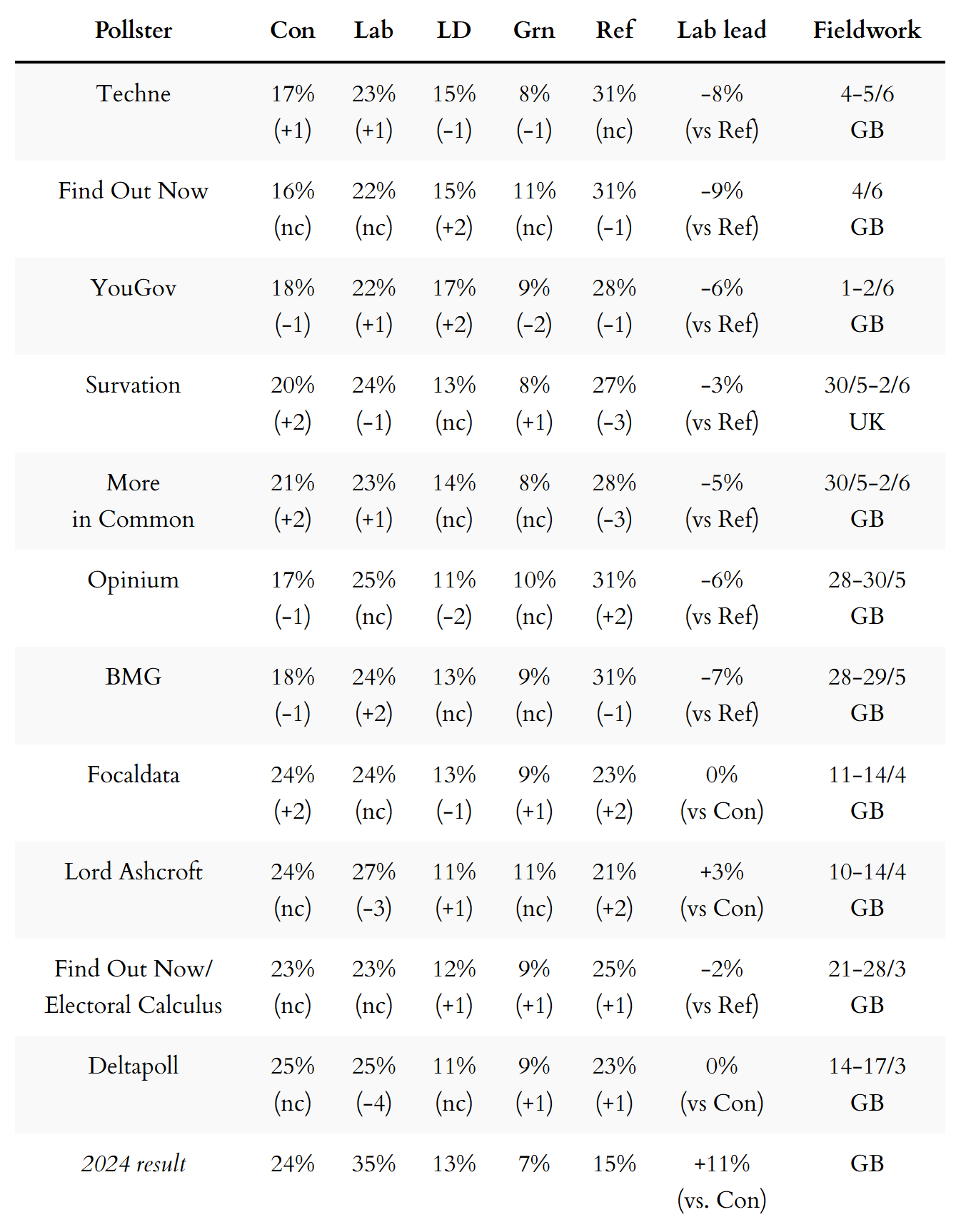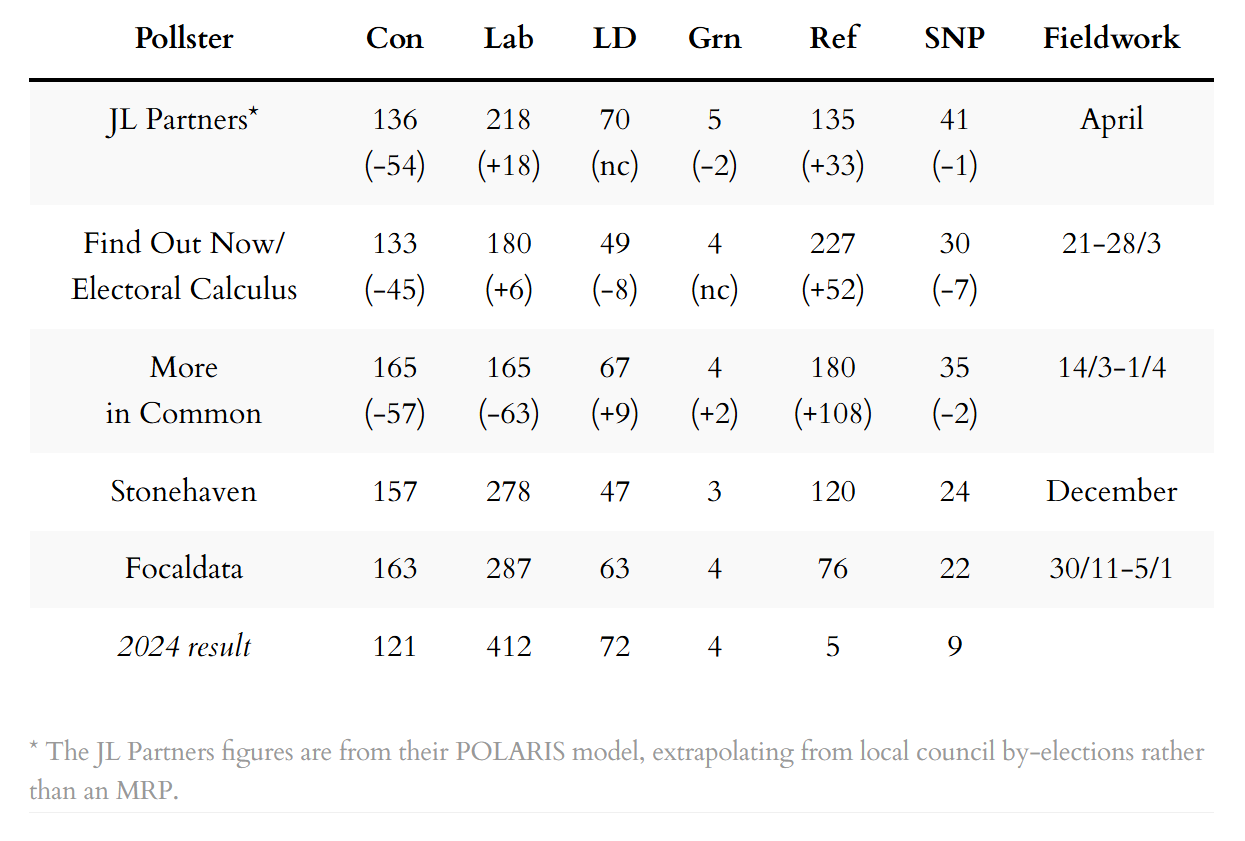Apparently inconsistent poll answers? Don’t blame the public
Welcome to the 164th1 edition of The Week in Polls (TWIP) which takes issue with a journalist’s criticism of the public for apparently supporting higher defence spending while opposing tax increases or cuts to other services to fund it.
Then it is a summary of the latest national voting intention polls and a round-up of party leader ratings.
Those are followed by, for paid-for subscribers, 10 insights from the last week’s polling and analysis.
This time, those ten include some surprisingly pro-immigration findings from Lord Ashcroft’s latest focus groups.
The Week in Polls often draws on the work of those at UK universities, so a little thank you for me in return with a special offer for anyone with a .ac.uk email address: you can sign up for the paid-for version of this newsletter at half price:
Before we get to the main stuff, I mentioned last time two recent defeats at the ballot box for populist challengers. So I should also note the victory, by a razor thin margin, for the incumbent2 populists in last week’s Polish presidential election, although the opposition did win in South Korea, defeating the ruling right-wing party whose previous President had tried to impose martial law.
And with that, on with the show.
Want to know more about political polling? Get my book Polling UnPacked: the history, uses and abuses of political opinion polling.
Cake, polls and public opinion: the problem isn’t the answers, it’s the questions

Thomas Howard, 3rd Duke of Norfolk, was an unlucky man to have as your uncle. Two of his nieces were beheaded by Henry VIII, after they had become two of his many wives. Thomas himself only avoided being executed by Henry due to the King dying just before the execution would have taken place.
Yet, despite his role in dramatic Tudor court politics, Howard’s most enduring legacy may be linguistic. He is the first person we know of who used the phrase, “a man can not have his cake and eat his cake”.
Writing to Thomas Cromwell on 14 March 1538, Howard mentioned that he needed to be sent his will so that he could update it, following his recent decline in wealth. It was, in other words, a phrase to indicate a rational response to reduced resources, downscaling his plans as a result.
Over the centuries since, the phrase’s wording has evolved as has its meaning - from a sober, rational, reflection on resource management to a dismissive retort aimed at those who want to have everything without sacrifice.
Which is why this phrase came to mind when I saw this posting from the Financial Times’s Robert Shrimsley:
The polling is from YouGov, 3 showing - as did polling by More in Common - public support for increasing defence spending.
Add to that the findings that people don’t want to pay more tax themselves nor do they want to see other public spending cut, and it is easy to mock people for wanting to have their cake and eat it. Or more pedantically, wanting to have their cake but not having to pay for their cake.
But this is unfair on people.
There is some preliminary quibbling one can make about how many people may have answered the questions consistently even within that overall pattern. And that some people may have been thinking thoughts such as ‘I’d increase borrowing to pay for this’ or ‘I’m sure other people are rich enough to pay enough extra tax without me having to do so’.
Those, though, also miss the bigger problem with using that polling to criticise the public. Quite simply, if polling questions ask people if they want good things and if they want to avoid bad things, then - unsurprisingly - plenty say yes to both. This does not necessarily reflect greed or irrationality, but rather the limitations of the questions themselves.
YouGov’s questions were all worded and conducted in respectable ways. But none of them asked people to make choices. None proffered trade-offs and then asked people to pick their desired mix of actions.
So no, Robert, these answers don’t tell you everything you need to know about the British public. They simply tell us how not to use polling to understand the public.
Voting intentions and leadership ratings
It is worth noting that Reform’s rise in the polls during May looks to have levelled off. There is no great sign of a decline, but consistent increases in their vote share are now in the past:
Next, the latest seat projections from MRP models and similar, also sorted by fieldwork dates:
Finally, a summary of the latest leadership ratings, sorted by name of pollster. Nigel Farage’s rating have noticeably improved in recent weeks, although in nearly all polls Ed Davey continues to be the best performing leader.
For more details, and updates during the week as each new poll comes out, see my regularly updated tables here and follow The Week in Polls on Bluesky.
For the historic figures, including Parliamentary by-election polls, see PollBase.
Catch-up: the previous two editions
My privacy policy and related legal information is available here. Links to purchase books online are usually affiliate links which pay a commission for each sale. For content from YouGov the copyright information is: “YouGov Plc, 2018, © All rights reserved”.4
Quotes from people’s social media messages sometimes include small edits for punctuation and other clarity.
Please note that if you are subscribed to other email lists of mine, unsubscribing from this list will not automatically remove you from the other lists. If you wish to be removed from all lists, simply hit reply and let me know.
Is it wise to associate yourself with DOGE?, and other polling news
The following 10 findings from the most recent polls and analysis are for paying subscribers only, but you can sign up for a free trial to read them straight away.
The Demos report, DOGE done better: The case for progressive efficiency and a streamlined state,5 is the latest example of those with politics very different from Elon Musk or Donald Trump nonetheless wanting to use their terminology…
Keep reading with a 7-day free trial
Subscribe to The Week in Polls to keep reading this post and get 7 days of free access to the full post archives.





